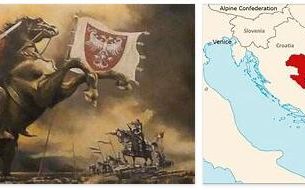According to mysteryaround.com, the quarrelsome and suspicious lords, vassals or rebellious or discontented subjects looked not so much to those distant kings as to the nearest lord of France. The political conditions of the peninsula worsened. Relations between Venice and Milan, between Naples and Venice, and even more between Milan and Naples, that is Sforza and Aragonesi, worsened after Il Moro, also pushed by his wife Beatrice and his father-in-law, Alfonso d’Este, Duke of Ferrara, had shown to want to override the rights of the young Gian Galeazzo, the husband of an Aragonese princess. In 1492 Lorenzo the Magnificent died. And he had just died, when rumors were already spreading of a league between Florence, pontiff, king of Naples, against the Moor and of Venetian threats to the Moor. In 1483 the young and imaginative Charles VIII had ascended the throne of France, who, made king after a long work of internal adjustment and when France returned to reappear on the world, to refresh old ambitions, to resume the old tasks between politicians and religious, he flattered himself to be the king of this restored France, the new hammer of the infidels, the new Charlemagne. Various territorial objectives were, more or less precise, in the face of French politics: the Rhenish region, first of all. When the Burgundian state collapsed, following the victories of the Swiss and the French, part of the inheritance had gone to the king of France who at that time also collected other inheritances, that of Provence, Anjou, Maine, Brittany; but the other part, to Maximilian of Habsburg, made in 1486 also king of the Romans. It was now a question, for the crown of France, of recovering this part of the Burgundian inheritance as well. But French politics also pointed towards the Alps. And, with Charles VIII, towards the Alps more than towards the Rhine, both for the imperial purposes that vaguely flashed to his spirit, and for the lesser difficulties that loomed on that side. Against the expansionary policy on the Rhine, there were serious obstacles. Instead, from Milan, Ludovico il Moro, feeling threatened by other Italian lords, urged the king to send an expedition against the Aragonese of Naples. Ludovico il Moro, also given his links with Genoa, was the key to an undertaking of this kind: and therefore his appeals had to give new incentive to the king, new strength to overcome the opposition he found around him against these. his Italian designs which seemed a deviation from the real politics of the kingdom. What is certain is that, in November 1492, Charles VIII made an agreement with Henry VII of England, undertaking to pay him a large sum of money and not to give any help to the pretenders to the English throne (treaty of Étaples); in January 1493, he made an agreement with Ferdinand the Catholic, giving him back the border provinces (Treaty of Barcelona); in May 1493, he made an agreement with Maximilian giving him the Franche-Comté and the Artois (treaty of Senlis). The treaty of Senlis was a kind of partition of Italy: Maximilian, free hand against Venice; Carlo, against Naples. In those same months (January 1493), there was an alliance between the king and Ludovico il Moro: and it meant the benevolent neutrality of the lord of Milan. Concerns and almost regrets followed on the part of the Moor. But now the king is all turned towards Italy. For Europe the rumor suddenly spread that Christopher Columbus had reached the Indies and took possession of Spain. And he was bait to the fire. Between 1493 and 1494, French embassies moved to the Italian courts. Here, everywhere they were people who made a good face, whether they did not want to find themselves against such a powerful king, or whether they really wished his advent. Now, not so much the lords as their internal enemies, eager to override or take revenge on them. Already Neapolitan barons had gone to France to point out to that court the way to Naples. Now, cardinals like Ascanio Sforza and Giuliano della Rovere, very enemies of Pope Alexander, also called. Pier Capponi from Florence, sent to Charles VIII to distract him from the expedition, instead made him a secret inciter, out of hatred of the Medici. And also Girolamo Savonarola in Florence, preaching for the civil and religious reform of the city, of Italy, of the world, invoked and prophesied a punisher and corrector. They were all calls to feed the will of the king, who was the really decisive factor of this expedition. In view of the French threat, Il Moro tried, in the course of 1493, to get closer to Venice, and signed the pact for the wedding of Bianca Maria Sforza with Maximilian of Habsburg. Except that, at the same time, king of Naples and pope made peace and also Florence approached them, in opposition to any possible Sforza hegemony; cardinal Ascanio Sforza expelled from Rome; Il Moro, isolated, unsure of either Venice or Maximilian, renounced all opposition to France and was perhaps even able to tell the French envoy to play his game.




